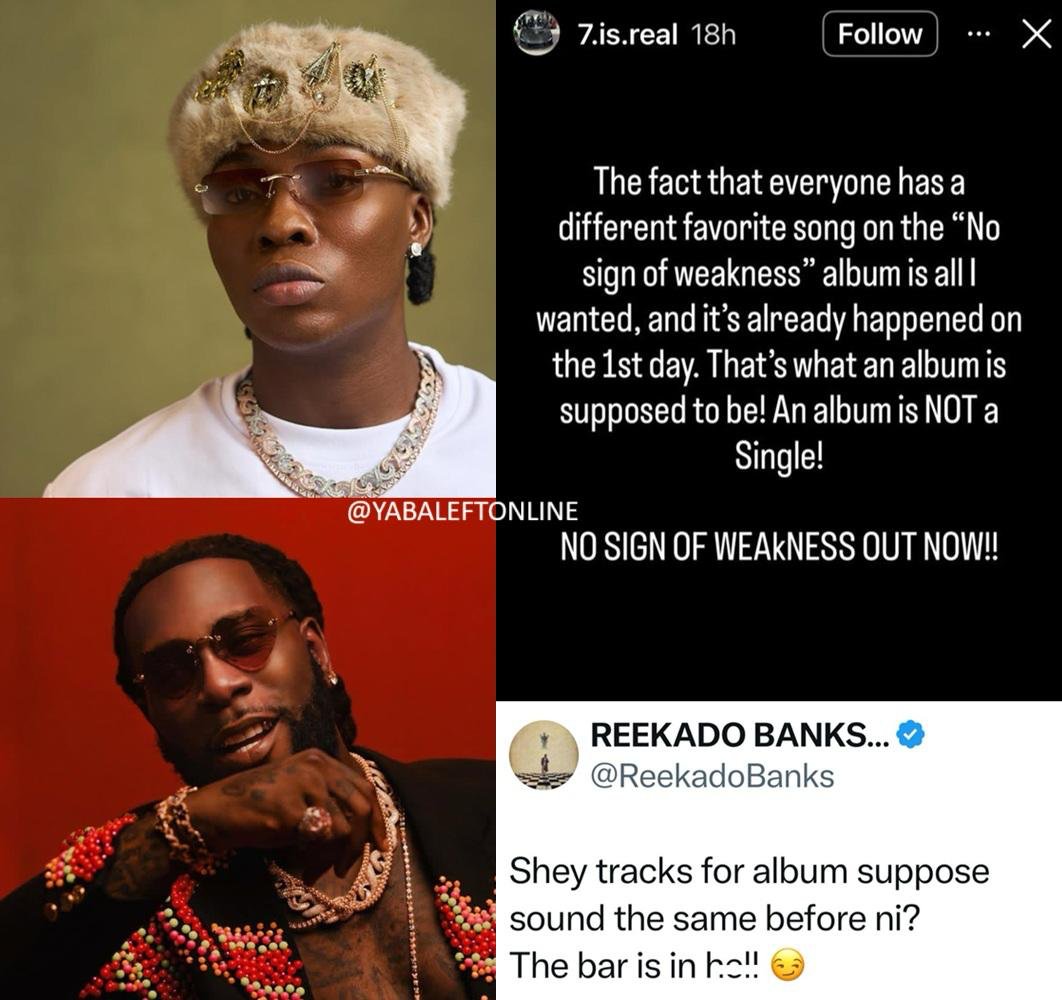
"The Bar Is in Hell": Reekado Banks Throws Shade as Burna Boy Defends His New Album

The Nigerian music scene was set ablaze again on social media after singer Reekado Banks appeared to take a direct jab at Burna Boy’s statement about his newly released album "No Sign of Weakness", igniting yet another wave of drama between Afrobeat heavyweights. In a move that has stirred intense reactions online, Reekado Banks tweeted, "Shey tracks for album suppose sound the same before ni? The bar is in hɛ!! 😏"—a post that fans and observers have unanimously interpreted as a shot fired at Burna Boy, who had just taken to Instagram to boast about the reception of his new body of work.
The whole drama began when Burna Boy celebrated the success of "No Sign of Weakness" on Instagram, stating, “The fact that everyone has a different favorite song on the ‘No Sign of Weakness’ album is all I wanted, and it’s already happened on the 1st day. That’s what an album is supposed to be! An album is NOT a single!” His statement, though innocuous at first glance, came across to many as subtly dismissive of artists who release albums that lack diversity in sound—a standard Burna clearly believes he has surpassed.
Reekado Banks wasn’t having it. Without mincing words, he quoted the general idea Burna expressed and countered it with his own sharp commentary, sarcastically questioning whether all songs on an album are supposed to sound alike and concluding with the now-viral line: “The bar is in hell.” With just one tweet, Reekado threw Twitter (now X) into a digital brawl zone, sparking reactions from fans, industry insiders, and observers.
Though Burna Boy did not mention any artist in his post, the timing, tone, and topic were too coincidental to be ignored. Burna’s statement had barely circulated before Reekado’s tweet emerged—just hours apart—turning a regular album rollout into a battleground of ego and artistry. Fans didn’t need much to connect the dots, and soon enough, hashtags started trending with people taking sides.
Supporters of Burna Boy saw Reekado’s tweet as a bitter reaction from a singer who, in their words, has been outshined in recent years. One Outsider tweeted, “When last did Reekado Banks have an album that people argued over? Burna just made a classic, and now it’s triggering people.” Others accused Reekado of fishing for attention, calling him out for using shade as a strategy to gain online relevance.
But Reekado Banks’ fanbase, as well as many neutral music lovers, came to his defense, arguing that his comment was not only valid but timely. “Some albums sound like one long, boring song. Reekado just spoke the minds of many. Burna should take it as constructive criticism,” a user posted. Others echoed the sentiment that being successful does not make an artist above critique, and that Burna’s proud declarations about his work often come off as dismissive of others in the game.
The shade is particularly juicy considering the history between the two artists. Back in 2020, Burna Boy had stated during a Q&A session that he didn’t consider Reekado Banks to be on his level musically. That moment lingered in the minds of fans, and it’s widely believed that Reekado never truly let it go. With this latest tweet, many are interpreting it not just as album critique, but as a long-delayed clapback at a perceived insult that was never properly addressed.
As the drama unfolds, some insiders are raising important questions about the unspoken tensions among top-tier Nigerian artists. With Afrobeats now enjoying massive global attention, the pressure to stand out, remain dominant, and constantly evolve is immense. Artists like Burna Boy, Wizkid, and Davido have consistently pushed their brands to the global stage, but in doing so, they sometimes come across as gatekeepers or self-crowned kings of the genre. For artists like Reekado Banks—who also made waves with multiple hits in the mid-2010s but has been quieter in recent years—there seems to be a growing urgency to remind the industry of their worth, even if it means calling out what they see as mediocrity or arrogance.
Interestingly, Burna Boy has remained silent on the matter. Whether he chooses to respond or not remains to be seen, but fans know that Burna often uses his music as a tool to settle scores. With the "No Sign of Weakness" album fresh on the shelves, some are speculating that future visuals or lyrics might contain veiled messages for those throwing shade.
Meanwhile, Reekado Banks has not clarified or walked back his statement. The tweet still stands—sharp, direct, and unapologetic. And judging by the engagement it’s received, he may have struck a chord with a segment of fans tired of what they see as industry self-praise masquerading as marketing.
In the end, whether this will snowball into a full-fledged beef or simply fade into the background of ever-churning social media chatter is uncertain. But one thing is clear: in a musical landscape where egos are as loud as the beats, it only takes one tweet to turn an album launch into headline news. Reekado Banks has not only reignited interest in himself with his post but has also stirred up a conversation about quality, humility, and respect in the Nigerian music industry.
As for Burna Boy, fans are now listening to "No Sign of Weakness" with more scrutiny, wondering if the songs truly showcase the variety he claims—or if, as Reekado suggests, the “bar” needs to be raised a little higher. The battle of opinions rages on, but one thing is undeniable: Nigerian music continues to keep fans talking, tweeting, and tuning in.


